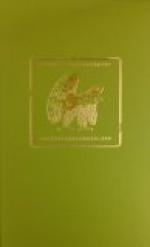She paused so long that Tisdale turned. She seemed very tired. The patient lines, fine as a thread, deepened perceptibly at the corners of her mouth. He hurried to save her further explanation. “Foster told me,” he said. “It was a beautiful memorial. Sometime I should like to go there with you. I know you met the first expense of that endowment with a loan from Miss Morganstein, which of course you expected to cancel soon, when you had found David at Seward. I understand how, when the note came into her brother’s hands, your only chance to meet it at once was through a sale of this land. And I have thought since I knew this, that evening aboard the Aquila, when you risked Don Silva’s ruby, it was to make the yearly payment at the hospital.”
“Yes, it was. But the option money from Mr. Banks made it possible to meet all my debts. I did not know they were only assumed—by you. Though, looking back, I wonder I failed to see the truth.”
With this she turned and took up the photograph which she had laid on the secretary, and while her glance rested on the picture, Tisdale’s regarded her face. “So,” he said then, “when the lost letter came back to you, you kept it; Weatherbee never knew.”
She looked up. “Yes, I kept it. By that time I believed little Silva’s coming and going could make little difference to him.”
“And you went on believing all you had heard at Seward?”
She bowed again affirmatively. “Until you told me the true story about Mrs. Barbour that night on the mountain road. I know now that once he must have loved me, as you believed. This house, which is built so nearly like the old hacienda where I was born, must have been planned for me. But, afterwards, when he thought I had failed him, when he contrasted me with Mrs. Barbour, her devotion to her husband, it was different.”
She laid the photograph down again to draw the tin box forward. The letters were on the desk with David’s watch, but there still remained a calf-bound notebook, such as surveyors use in field work. It fitted snugly enough for a false bottom, and she was obliged to reverse the box to remove it, prying slightly with a paper-knife. Tisdale’s name was lettered across the cover, and the first pages were written in his clear, fine draughtsman’s hand; then the characters changed to Weatherbee’s. She turned to the last ones.
“This is a book you left among some old magazines at David’s camp,” she explained. “He carried it with him until he discovered the Aurora. He began to use it as a sort of diary. Sometime you will want to read it all, but please read these last notes and this letter now.”
She waited a moment, then as he took up the letter and began to unfold it, she turned and went out into the patio.
The letter was from Lilias Barbour. It was friendly, earnest, full of her child and a gentle solicitude for Weatherbee. Hollis read it through twice, slowly. The last paragraph he went over a third time. “You are staying too long in that bleak country,”—so it ran. “Come back to the States, at least for a winter. If you do not, in the spring, Bee and I are going to Alaska to learn the reason. We owe it to you.”




